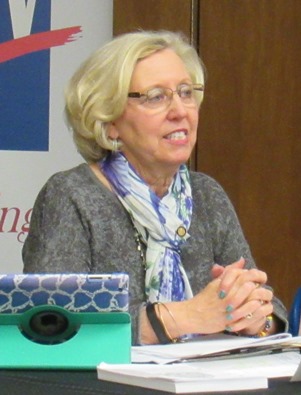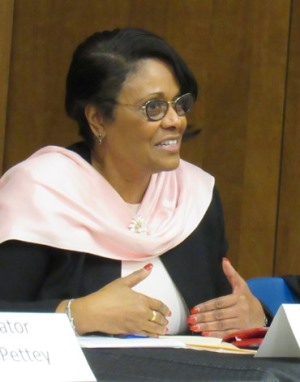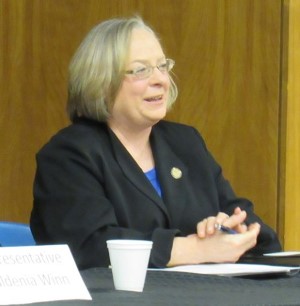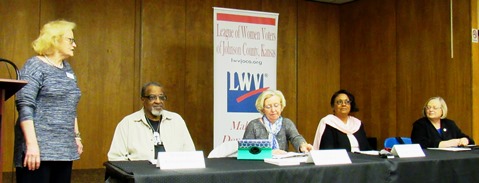by Mary Rupert
School issues were on the minds of some of those who attended a legislative coffee this morning at the Main Kansas City, Kan., Public Library, 625 Minnesota Ave., Kansas City, Kan.
The legislative coffee, with three local legislators, was sponsored by the League of Women Voters, the NAACP and the Kansas City, Kan., Public Library.
Rep. Valdenia Winn, D-34th Dist., said one of the bills is a “gut and go” effort yesterday that would repeal the common core initiative in July 2017 and direct the State Board of Education to come up with new standards after 2017.
On the school finance topic, the Kansas Supreme Court has ordered the Kansas Legislature to come up with a way to increase equity funding for four school districts, including the Kansas City, Kan., Public Schools, by June 30, putting the Legislature under a deadline. At the same time, the state is facing new revenue shortfalls each month.

Sen. Pat Pettey, D-6th Dist., said one school finance bill, Senate Bill 512, would take money out of one pocket and put it in another.
The Legislature had changed to block grant funding last year, but this new bill brings back local option and capital outlay state aid funds.
Senate Bill 512 called for$14.5 million for the local option budget and $23.5 million for capital outlay. To fund it, it would take 1.45 percent of the school district’s block grant and give it to the state to pay for LOB and capital outlay. Sen. Pettey, who is a former teacher and former school board member, expects the bill to be on the Senate floor next week. She said that Senate Bill 512, “sadly,” will probably pass the Senate. There is another House bill that deals with school finance.
Spending by all local units of government and school districts has been criticized by conservative legislators who are in the majority. Sen. Pettey said, “No state has better academic results with less money than Kansas.”
She also said many bills concerning education are being worked outside the Education Committee this year. Some are in the Appropriations Committee.
Another proposed bill, Senate Bill 311, would take authority away from the State Board of Education and transfer it to the administration, and it created such a stir last week that it probably will not move forward this year, she believes.
A third bill, Senate Bill 505, Sen. Pettey said, is still in committee and addresses revenues in school districts’ funds at the end of the year. It would reduce what the bill’s sponsors believe are excess funds. She said she heard from the Bonner Springs superintendent, Dan Brungardt, who brought up concerns about the bill. Sen. Pettey said school districts have areas where they need reserve funds. For example, the districts don’t receive money from the state until October, but they have to pay teachers as soon as school starts. They also need funds in reserve to cover transportation, she said.
One Kansas City, Kan., Public School teacher in the audience was concerned about school finance issues. If the Legislature does not meet the deadline for a school finance decision that meets directives from the Kansas Supreme Court, there has been speculation that school might not open on time next fall. She said she was concerned that she then might be in breach of her contract because it requires her to be at school on a certain date.
Repealing the common core initiative
Rep. Winn said that while many of the bills do not seem to make sense to some observers, they make sense when one understands that the majority party is on a mission to shrink state government. Most of the Education Committee’s focus this year has been on looking for ways to save money, she said.

Rep. Winn said a bill to repeal the common core, House Bill 2292, was passed out of the Education Committee and may go to the full House on Monday. Rep. Winn opposed the bill in committee. The bill takes some of the authority away from the State Board of Education and says the Legislature should review standards.
Rep. Winn, a college professor and a school board member, is very concerned about the repeal of common core standards. She believes schools could lose Advanced Placement courses, International Baccalaureate courses, concurrent enrollment and dual credit, because they are aligned to the common core standards.
This could affect a graduate’s ability to be admitted to a college or university because the graduate won’t be prepared, she said.
Another concern is that some exams at the end of career training are tied to the common core, such as certified nursing aid, mechanic certification and technology certification, she said.
Reading initiatives such as iStation and Lexia also would be affected, she believes, as well as America’s Graduates Program. Many assessments that monitor progress also are tied to the common core, she said. Textbooks that are aligned with the common core also could be affected, meaning that school districts could have to replace their textbooks.
Rep. Winn said scrapping the common core could cost the state millions of dollars. Also, the bill does not give enough time to develop new standards.
While the proposed law called for testing in three grades, federal law has a requirement for testing in third through eighth grades plus once in high school, according to Rep. Winn. If the state doesn’t meet minimum federal testing requirements, it would put $200 million-plus in title and special education program funding at risk, according to Rep. Winn.
The legislators at the coffee, all Democrats, were not too optimistic on getting legislation passed this year that they favored. Only 28 of the 125 representatives in the House are Democrats, and only eight of the 40 senators in the Senate are Democrats.
They are hoping the situation changes in November. “We’re looking to get more Democrats in the House,” Rep. Winn said.
Bill to eliminate food sales tax
A bill to eliminate the 6.5 percent sales tax on food probably will not pass this year, according to the legislators. Sen. Pettey said a bill in the Senate probably will not get moved to the Senate floor. Last week there was a proposal to reinstate taxes on some business corporations, while at the same time reducing the sales tax on food.

Rep. Pam Curtis, D-32nd Dist., said an effort is underway in the House for a similar bill. However, she said while she would like to see the food sales tax lowered, she was advised that the danger of lowering the sales tax on food would be what they have to give up in exchange, such as the earned income tax credit.
KanCare expansion
Sen. Pettey said she does not see a KanCare expansion bill passing in the Senate this year, despite the Kansas Hospital Association’s work in crafting a bill.
Rep. Curtis said there have been efforts to keep any bills off general orders in the House that might be germane and likely to be amended for Medicaid expansion.
Rep. Winn said there have been polls stating that Kansans support Medicaid expansion, and that the majority party is ignoring the will of the people.
Tax lid legislation
Rep. Curtis said there are a lot of bills telling local governments what to do. There have been bills against cities being sanctuaries for undocumented immigrants, bills on rental licensing, and yesterday, a bill that would prohibit local governments from regulating junk food.
One bill eliminated the state sending out statements on vehicle renewals, and replaced it with a postcard. Residents would have to look up their bill on the Internet or they could walk into the county treasurer’s office to find out how much it was. In Wyandotte County, officials decided they would rather foot the bill for their residents’ statements than have all the added traffic.
“A lot of these bills are solutions looking for a problem,” Rep. Curtis said.
Local governments are very concerned about a tax lid law that says local governments can’t raise taxes above a certain amount without a vote of the citizens.
When the tax lid law passed last year, there was no hearing on it and representatives of cities and counties did not get to testify, Sen. Pettey said. She does not think the Legislature will repeal it. There has been discussion about its effective date. A proposal to implement it in 2016 has been negotiated to 2017.
Kansas City, Kan., and county officials have said previously at their meetings that the tax lid is an anti-growth law. In communities where there is growth, the amount of tax revenue collected grows because of new growth, not necessarily because of a tax increase, the local officials have said. The effect could be that local officials will not want to lower taxes because they will not be able to raise them again in a future year without a vote, they have said previously.
Sen. Pettey said since 2006, Wyandotte County has lost more than $18 million a year in revenue from the state.
STAR bonds and Wyandotte County
Last week, the Senate advanced an override of the governor’s veto of a line item that would have prohibited Wyandotte County from future STAR (sales tax revenue) bond usage.
However, the next day, the Senate passed a 10-point STAR bond reform provision that will supersede the Wyandotte County STAR bond ban, and would allow Wyandotte County and other areas to use STAR bonds under certain conditions, including more state control. STAR bonds were used to build The Legends and other Village West buildings. The reform provision had bipartisan support. It had several changes, including requiring an audit every year to be paid by the developer.
Sen. Pettey said she believes, from information she has received, that the new STAR bond provisions will apply only to new STAR bond projects and not to existing projects. That could mean the new rules could apply to any attempts to move the American Royal to Wyandotte County, which hasn’t been approved and is in an early discussion stage.
In the earlier bill where a provision had been vetoed, Wyandotte County had been singled out by name, even though it was the only county in Kansas to so successfully use STAR bonds, and the STAR bonds were paid off four years early, she said. It was more micromanaging from the state level, and so far the STAR bond legislation has been amended six times, she said.
Many other legislative topics also were discussed at the legislative coffee Saturday.

